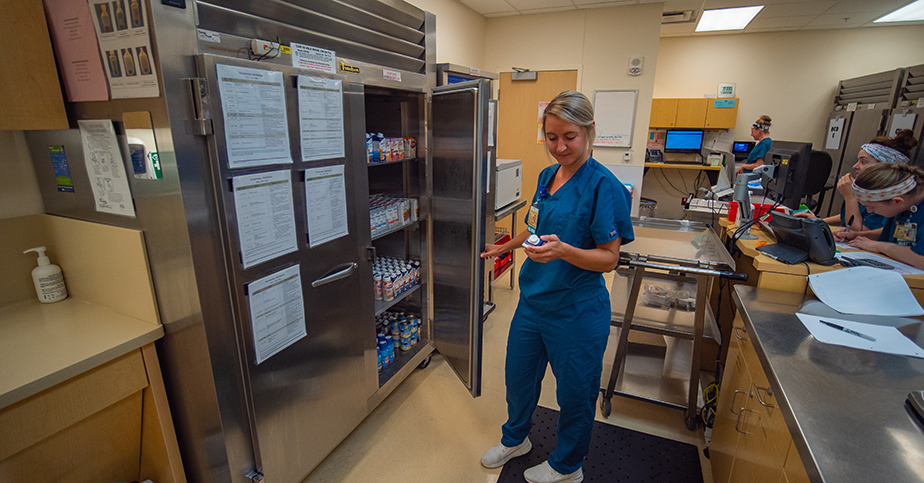Master of Public Health Degree in Nutritional Sciences
The Department of Nutritional Sciences at the University of Michigan School of Public Health offers a highly customizable Master of Public Health (MPH) degree for students who wish to pursue careers in the field of human nutrition in a wide range of clinical, community, advocacy, research, policy and governmental settings.
Applicants to the Nutritional Sciences MPH degree should have a strong interest in science and health. Successful students often have an undergraduate degree in a field of basic or applied science, or, at a minimum, have taken courses in biology, physiology, general and organic chemistry, and biochemistry.
Degree Options and Concentrations
The first choice MPH students have is whether to pursue a dietetics concentration. This optional concentration has additional requirements as a path to the Registered Dietitian Nutritionist (RDN) credential.

MPH in Nutritional Sciences - Dietetics
2-YEAR PROGRAM | 50+ CREDIT HOURS | 1,000+ HOURS EXPERIENTIAL LEARNING
The Department of Nutritional Sciences provides a direct path for students wishing to become a Registered Dietitian Nutritionist (RDN) by combining didactic learning and supervised practice into an integrated 2-year program of study and field experience. This concentration is available to students pursuing an MPH in Nutritional Sciences or an MS in Clinical Nutrition.
Students will complete more than 1,000 hours in supervised experiential learning, including an integrated summer internship, as part of the path to becoming an RDN.

MPH in Nutritional Sciences
2-YEAR PROGRAM | 60 CREDIT HOURS | SUMMER INTERNSHIP
This degree program is for students who do not wish to become a Registered Dietitian Nutritionist (RDN). The MPH degree is a two-year, 60-credit-hour degree with a summer internship for students who wish to pursue careers in the field of human nutrition in a wide range of community, advocacy, research, policy and governmental settings.
Focus Areas and Certificates (optional)
The Department of Nutritional Sciences offers two focus areas within the MPH degree - Sustainable Food Systems and Maternal Child Nutrition. These are available to all MPH students and can be incorporated into the curriculum using elective credits.

Sustainable Food Systems Focus Area
The focus area in Sustainable Food Systems will provide students with both an understanding of the fundamental linkages between modern food systems and human nutrition, as well as the opportunity to explore specific topics in greater depth. The curriculum for this interdisciplinary focus area draws on the expertise of faculty from many different units across the University of Michigan campus in recognition of the increasing demand in the professional marketplace for interdisciplinary scholars and practitioners.
| Course Number | Credits | Course Name |
|---|---|---|
| NUTR 555 | 3 | Foundations of Sustainable Food Systems |
| NUTR 525 | 3 | U.S. Food Policy |
| Select 3-4 credits from the Food Systems Courses (link below): | ||
| The Sustainable Food Systems Initiative website tracks all food systems related courses across the university each semester. Students may identify other food systems related courses offered throughout the University in a given academic term, and with approval from the Department of Nutritional Sciences, take these courses to fulfill their elective requirement for the focus area in Sustainable Food Systems. Many of the elective courses listed above are not offered every year. | ||
Maternal and Child Nutrition Focus Area
The Maternal and Child Nutrition focus area aims to provide graduate students the fundamental knowledge to understand the integral role of nutrition in maternal and child health. Students will have the opportunity to explore specific topics including family and women's health, epigenetics, developmental origins of health and disease, toxicology, and reproductive health and endocrinology.
| Course Number | Credits | Course Name |
|---|---|---|
| Select three from the following: | ||
| NUTR 540 | 2 | Maternal and Child Nutrition |
| NUTR 660 | 2 | Environmental Epigenetics and Public Health |
| NUTR 510 | 3 | Nutrition in the Life Cycle |
| NUTR 677 | 2 | Physical Growth and Maturation |
| Select two from the following†: | ||
| EHS 622 | 2 | Mechanisms of Developmental Toxicology |
| EHS 623 | 2 | Mechanisms of Reproductive Toxicology |
| EPID 550 | 3 | Reproductive Epidemiology |
| EPID 673 | 3 | Epidemiology of Developmental Origins of Health & Disease (DOHaD) |
| HBHE 603 | 3 | Population Change – Gender, Family, & Fertility in Africa and Asia |
| HBHE 614 | 3-4 | Women's Health and the Timing of Reproduction |
| HBHE 629 | 3 | Families and Health |
| SOC 595 | 3 | Families and Inequality |
| PHYSIOL 510 | 4 | Principles of Systems and Integrative Physiology |
| PHYSIOL 541 | 4 | Mammalian Reproductive Endocrinology |
Certificates and Volunteer Work
For a deeper dive, MPH students in the Department of Nutritional Sciences can earn graduate certificates across the University of Michigan. Graduate certificates require at least 12 credit hours in the designated area; elective credit hours can be used to fulfill this requirement.
In the past, many Nutritional Sciences MPH students have had interest in the following certificates: Physical Activity and Nutrition (PAN), Sustainable Food Systems Graduate Certificate, and Maternal and Child Nutrition Certificate.
MPH students also have the opportunity to volunteer and work with organizations throughout Ann Arbor, Ypsilanti, Detroit, and other southeast Michigan communities.
Program Curriculum and Prerequisites
MPH students will acquire advanced knowledge and understanding about public health nutrition topics including:
- The biochemistry of cellular nutrition.
- The application of nutritional sciences to individuals, groups, and populations.
- Factors that affect accessibility, adequacy, and safety of the food supply system (production, processing, distribution, and consumption) and the relationship to community food systems assessment and analysis.
- The relationships between food intake, nutrition, contaminant exposure, and biological and chemical hazards.
- Federal, regional, state, and local government structures and processes involved in the development of public policy, legislation, regulations, and delivery of services that affect food intake, nutritional status, and population health.
During the MPH program’s first years students complete required public health core courses and nutritional sciences core courses, however, MPH students have flexibility within their schedule to take classes outside of the Nutritional Sciences department if they choose to do so.
MPH students are encouraged to take classes in other graduate school programs across campus. Every semester, Nutritional Sciences students take classes at the Ross School of Business, School of Social Work, School for Environment and Sustainability, Gerald R. Ford School of Public Policy, and others. This provides an opportunity to engage with students and faculty from other disciplines.
| Course Number | Credits | Course Name | Term |
|---|---|---|---|
| PUBHLTH 500 | 6 | Investigating Public Health Issues | Fall |
| PUBHLTH 501 | 6 | Developing Public Health Solutions | Winter |
| Course Number | Credits | Course Name | Term |
|---|---|---|---|
| NUTR 640 | 3 | Nutritional Assessment | F |
| NUTR 688 | 1 | Nutrition Seminar (year-long course) | |
| NUTR 630 | 3 | Principles of Nutritional Sciences | F |
| NUTR 631 | 3 | Metabolism of Vitamins and Minerals | W |
| NUTR 601 | 1 | Professional Development and Teamwork | W |
| NUTR 602 | 3 | Communication, Leadership, and Management for Dietetics | W |
| NUTR 642 | 3 | Community Nutrition | W |
Sample Schedules
- MPH Nutritional Sciences Sample Schedule (no concentration) (PDF)
- MPH Nutritional Sciences Sample Schedule (dietetics concentration) (PDF)
Internships
All MPH-Nutritional Sciences students are required to complete a summer internship between their first and second years. For MPH-Dietetics students, the internship will be incorporated into their summer supervised experiential learning hours.
The Department of Nutritional Sciences has strong relationships with a variety of sites for students to choose from when starting their summer internship search. Each summer there are several students who are successful in securing global public health internships or opportunities outside of the state of Michigan. All internships are public health-focused with a nutrition component.
In recent years, Nutritional Sciences students have completed internships at Google, MDining, Food Gatherers, Project Healthy Schools, Center for Science in the Public Interest, community health and social services organizations, Academy of Nutrition and Dietetics, Henry Ford Hospital, farmers markets, Washtenaw County Health Department, and U-M Athletics, among others.
Prerequisites
- Inorganic/general chemistry* (1 semester, lab not required)
- Organic chemistry (1 semester, lab not required)
- Biochemistry (1 semester)
- Human Physiology (1 semester that includes digestion and endocrine) or Human Anatomy and Physiology (1 semester of each and must include digestion and endocrine, lab not required)
- Microbiology (dietetics students only, includes introduction of bacteria, viruses, parasites, and food or medical environment)
- English* (dietetics students only)
- Psychology*, anthropology, or sociology (dietetics students only)
*AP high school classes are accepted based on AP final exam score
How to Apply
Applications for the Nutritional Sciences MPH program are processed through SOPHAS. Visit our ‘Applications & Deadlines’ page to start the application process.
All applicants must complete a brief interview. The interview is an asynchronous assessment in which you will be asked to submit timed responses to pre-recorded questions. You will access the interview online, on your own time, from a computer device equipped with a webcam and microphone. A link to the Kira interview system will be included in your application.
More Information
For questions, please contact Keegan Gramza, Student Services Coordinator, at [email protected]

